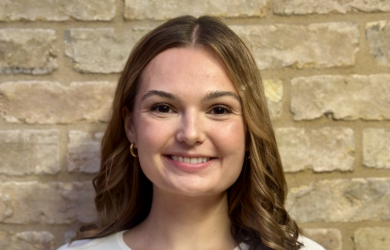Nuria Gonzalez Rabade has always been torn between her two passions – science and literature. Rather than opting for one or the other, however, she has managed to combine the two through her research on edible vaccines and her fiction writing.
Nuria, who finished her Gates-funded PhD in Plant Sciences last April, has loved reading and writing since she was a child, but was also fascinated by biology.
Born in Mexico, she grew up in Puebla, a city two hours’ drive from Mexico City, in a family where arts and sciences were equally popular. Her Mexican father was a civil engineer by training, but he was also a concert pianist who travelled the world, sometimes with the family in tow. Nuria’s Spanish mother was a professor of art history and literature. Her older sister, who she shared a house with while they were both studying for PhDs at Cambridge and is still based in the UK, chose to study physics and art history at undergraduate level.
At school, Nuria produced theatre plays and did a lot of writing and when she got to university, The Universidad de las Americas in Puebla, she majored in biology and minored in literature. “I have always done both things at the same time,” she says. “It is good to have something else that you are interested in besides science. It keeps you balanced.”
While at university, she went on an exchange trip to Nottingham University, where she also studied biology and literature. It was her first introduction to the UK, though not to Europe, since her family spent many summers in Spain.
She graduated from the Universidad de las Americas in 2005. Her sister was already at Cambridge and Nuria was offered a one-year internship in the Plant Sciences department. She specialised in edible vaccines derived from plants, focusing on TB. She loved it so much that she applied for a Gates scholarship to do a PhD researching an edible vaccine for AIDS. Her research was part of a Pharma-Planta project, a European consortium of researchers working on the production of pharmaceutical proteins in plants. Her project consisted of research in Ireland, Germany and the UK. The researchers sought to grow a multicomponent AIDS vaccine in tobacco and tomato plants, using some immunogenic parts of HIV. They tested the results by assessing immunological responses in mice. Nuria says that the research showed that plant material could be used to grow a vaccine successfully.
She adds that creating edible vaccines could have a huge impact, particularly in developing countries with agriculture-based systems, because it will mean they can grow large amounts of the vaccine fairly cheaply with no special equipment or staff needed.
Since completing her PhD she has been writing articles on it and doing more research on enhanced plant expression of proteins, in Cambridge. She has been offered post-doctoral work at the Instituto Politecnico Nacional in Mexico, researching edible vaccines using algae and lettuce for the human papilloma virus, HIV, dengue and diabetes.
She is keen, however, not to lose touch with her love of literature. At Cambridge, she set up a short story workshop in Spanish, which met weekly. She was also on the board of several university publications. Since arriving back in Mexico, she has been submitting work to literary magazines and is writing a short novel.
The Instituto has said she can pursue other interests while doing her post-doctoral work. “They have been very supportive,” she says, “so I can continue to balance both my scientific work and my love of literature. I really can’t let go of either.”












